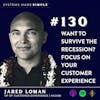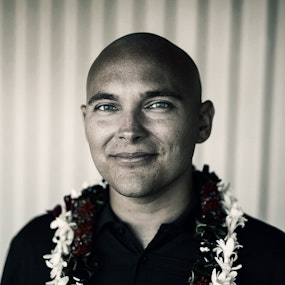Want to Survive the Recession? Focus on Your Customer Experience with Jared Loman

Today, I’m chatting with Jared Loman of Kajabi about the practical tips you need to create an unforgettable customer experience (and why your business needs this to survive). PLUS, discover what makes or breaks your ability to retain clients and earn referrals as an online business owner!
When was the last time you thought about the customer experience in your business?
In the midst of a recession, it’s essential to examine ALL of your business systems and processes to ensure that you not only survive these harder economic times, but grow despite them.
Today, I’m talking with Jared Loman, VP of customer experience at Kajabi, to find out their secret sauce for creating a stellar customer experience, and why this is so important for online business owners.
BY THE TIME YOU FINISH LISTENING, YOU’LL WALK AWAY WITH:
- The simplest way to create more revenue in your business this month WITHOUT creating new offers or raising your prices
- What it’s costing you (in real revenue) NOT to have a deliverability system as one of your key business systems
- How online business owners make or break their customer experience and their ability to retain clients and earn referrals
_____________
Liked this episode? Pay it forward and share it with a friend.
Love the show? Write a 5-star review — even one sentence helps us keep bringing you the content you want to hear.
More from Courtney:
- Website: theeffortlesslife.co
- Instagram: @thecourtneyelmer
Some product links on this site are affiliate links, which means we'll earn a small commission for any affiliate purchases you make (at no additional cost to you). We only recommend products that we use and/or personally trust, so you can browse with confidence.
All Rights Reserved | © The EffortLESS Life®
Courtney Elmer 0:00
Welcome back to the AntiFragile Entrepreneurship™ Podcast. This is episode 130.
[Intro]
Courtney Elmer 2:36
So today, I'm joined by a very special guest, Jared Loman, who happens to be the VP of Customer experience at Kajabi. Jared, I'm so excited to have you here today.
Jared Loman 6:06
I'm excited to be here. Thank you for having me on Courtney Elmer
Courtney Elmer 6:09
Absolutely. I'm really curious just to kick us off, you know, if you would just give us a bit of a background as to how you came to be in this position, leading the customer experience department at Kajabi.
Jared Loman 7:00
[Jared tells his background story]
Courtney Elmer 10:31
So I'm curious, Jared, to hear from you. How in your own words, would you describe what, what does it mean to have a good customer experience? If you were to define customer experience? How would you define it?
Jared Loman 12:50
First of all Courtney Elmer, It really starts and ends with listening to your customers. It's it's something that we say and it kind of I think for most people, they might hear that and go Yeah, and it bounces off and they you know, they let it go. But the reality of this is, is this applies in so many different areas. We may call it different things like depending upon like the type of business that you're in what you're doing. But truly, truly listening, not just listening, but understanding who your customers are, like when they experience a problem that they're trying to solve knowing, like what that problem is, can help you craft the solution for them.
That is ultimately going to make them again, like long term outcome is that they stay around at least in software as a service. Speaking on Kajabi terms, but even as an entrepreneur, it's a repeat business. You know, if you don't have a subscription model, it's that they come back and they buy from you again or that they refer you to their friends and family. All of that is, you know, it's effectively retention. Although, you know, entrepreneurs don't usually describe it as retention unless they're in a subscription based business. So yeah, that's that, to me is customer experience Courtney Elmer, if I could sum it up into a few words is listening to your customers, at least at the foundation.
Courtney Elmer 15:17
Yeah. And it's so important, like you said, I think it gets dismissed a lot in this space, you know, and I see this all the time where entrepreneurs are so focused on whatever stage they might be in their business, whether they're just starting up, whether they're trying to scale, the focus seems to always be on marketing and sales, which those are two functions of a business, you need to market to get visible, you need sales to stay in business, I get it, they're important.
But one of the ways that I like to describe it, it's like, you know, the white glove or the Disney level experience, or the Kajabi level experience, it's like, the level of experience that you would expect, is what you should also be delivering. And one of the keys to unlocking what that is, like you said so well as listening. So I'm curious, and what are some of the things that you listen for? Are you listening to what people say? Are you listening to how they say it? Is it kind of a combination of both read between the lines and like figure out? Okay, what is it that they really are saying they want? And what is it that they really need that we can provide?
Jared Loman 16:54
Courtney Elmer, I relate this back to I keep going back out of kind of my Kajabi realm and back into entrepreneurial world, but when you when you are hired to provide a service, like there is a an implied agreement that you actually know something that I don't, or you can do something that I cannot do, you know, 99.9% of the time, like, so especially, especially as like as a service provider, business owner, entrepreneur, like, you've got something that you're contributing to this conversation. So there is a component, when a customer asks for something, you may you may not always give them exactly what they want. You want to bring in your expertise and your experience as well.
Of course also try to take both into account Courtney Elmer, because I mean, I'm sure you've all heard the there's the old, like the Henry Ford quote of like, if I asked my customers what they want, they would have asked for a faster horse. And I think that's applicable sometimes. It's also very, very important to sometimes listen to things at face value, when they say I've got a problem, there's a bug here, we need to listen to that. And we need to respond to that.
So one of the things that we're trying to do Courtney Elmer is we're trying to really combine all of our customer feedback sources. So that means like when you're talking to Spartan, when you're interacting with our team, like all of that creates a ticket within our system, which we are categorizing and we're trying to get some type of, we're trying to get a quantitative look at what are the common trends? What are the things that people are talking about, because kind of the beauty of the ticket data is you get a little bit of the like, nobody is going to put in a feature request for fixed like while you fix this thing. They just expect it to work. So you're not going to you know, you're not going to find that data.
I'll say this upfront Courtney Elmer, just in case there are other Kajabi customers listening to this. We don't always get it right we don't always get it perfect. It's a challenge we like everyone else like all of you have to prioritize make decisions based on on, you know, our overall bandwidth and availability. But the fact of the matter is, is our prioritization is solving the problems that matter to you most.
Courtney Elmer 20:08
So well said, I think that, you know, what I'm really hearing you say, Jared is like customer experience boils down to how well do you solve problems, and to know what those problems are, and to be able to identify those who have to listen. But then really where the experience piece comes into play is how well are you solving them? You know, to what degree? are you solving them for that person? And are you solving them before it's even a problem for them? Right. what's your process for distilling down, like, what's urgent, what's important? What needs to happen now versus what can wait till later? Do y'all have a specific process for that? I'm just curious to hear you know, what that looks like, behind the scenes?
Jared Loman 21:11
It depends Courtney Elmer on of course, severity is going to play into, like, if the apps not working, everything is on hold until you have the service that you're paying for working reliably. That's zero, always, as it relates to bugs, stuff, it's software, there are bugs, there are going to be problems. If there's something that's fairly critical, and you're not able to accomplish the tasks that we're promising that we sold you on, then like, we need to fix those fast feature feature development is kind of a different path.
What we want to do Courtney Elmer is, we want to be very deliberate about, again, collecting all of the data, because if we do, we're going to be doing our customers a disservice. If it's simply if I get on a call, like, let's say if with you and I say, Courtney Elmer, what matters to you? Like, what features should we develop, you're probably going to say one thing. And if I hop on a call with someone else, they're probably going to tell me something totally different. It's just the reality of it. There's nuances associated with all of our businesses.
So to do our customers or service at the scale we're operating, we really do need to understand like, what is the impact on the collective? How can we make the most of our time and resources because again, Courtney Elmer, like priority, like we have a limited number of resources, we cannot as much as we want to, I want us to do everything, but we can't. So behind the scenes, it's a it's just like anyone else, it's just like you do and all of your businesses. The Holy Grail of this is really, truly feeling like we understand and empathize with the journey that our customers are on.
Courtney Elmer 23:10
The Kajabi team share before is like, your success is our success. And I feel as a user, there's a feeling that comes with that it's genuine, it's authentic, like, you believe that to your core, your team believes that, and it comes through and I think that there's a level of trust that is created there, right between like your company and the the end user, when that is taking place, but at the same time, like, and this is where I want to go with you next, because just I'm personally curious about this, but is that what you set out? You know, was that your mission? You know, it's okay, we're gonna create a great customer experience, and you know, their success is our success.
Courtney Elmer
That is the mission like, you know, to the end, and whatever it takes, you know, and of course, within reason, like you said, bandwidth is limited resources can be limited, etc. But that that's the mission, that's the end goal, or was that something that was developed along the way? And I guess my second question to that would be for those listening, should they also craft a similar mission within their own business? And maybe it's verbatim what you guys do? Just copy and paste and go for that? Maybe it's something different, but should they have that almost as a guiding post or a guidepost to help them in their delivery of that experience?
Jared Loman 24:27
If you don't mind Courtney Elmer, I'm gonna answer the second question first, because I think it is absolutely imperative. So I also, we run a run a podcast for Kajabi called the Kajabi edge podcast, and we're now at like, we're almost we're almost at our one year anniversary. So it's a weekly podcast. So I've talked to about 50 ish Kajabi customers wait a few weeks off for the holidays. And over the course of those 50 plus interviews of customers on a variety of different trajectories. So like people who started and made it really big really quickly, people that it took them several years to build out their business.
Jared Loman
People who are just seeing the first signs of traction and are still fairly are very early on. Like the one thing that I constantly hear. And this is now on repeat, I've said it multiple times. Any guesses Courtney Elmer? Listen, yeah, listen to your customers like, and that happens on virtually every level. And it really should start from day one. Like before, you're even in like, like, before, we're even crafting a business. Like I know, like, a lot of people start with the end in mind, they think like, oh, I'm a I'm a plumber.
Jared Loman
And so therefore, I'm going to start a plumbing business that's a little bit more straightforward, I guess, for example, on my part, but like, understanding the specific needs that your customers have, can not only contribute to your success when you have a business established, but also in establishing a business, knowing what the needs are solving a problem for someone is the root as is at the root of every business. And that's what listening to your customers is like that helps you ultimately solve problems for people.
Jared Loman
That's why they pay you that's why they do business with you. So your second question Courtney Elmer, yes, like there is, if there's any one thing anyone can do listening to this, stop right now, take a moment to in some way, shape or form. Even if it's just like getting a piece of paper out writing a list. Like think about the problems your customers are encountering encountering, go like if you have a digital product, experience it for yourself. Or if you feel like if you're super techie, like call your mom, call your Grandma called the most the least technical person, you know, if you have a digital product and have them use it, and see like, just just learn, like where the struggles are, so that you can begin to understand what are the likely challenges that someone is going to encounter? Yes.
Going back like, to your question Courtney Elmer, on like our mission, like I can speak so I've been with Kajabi for about three and a quarter years. Now. In some ways we have I mean, the team has grown significantly, I'm considered an OG in some capacity. But realistically, there's, there's people that have been here for 12 years. So I would say that customer experience or like just the focus on customers is at the core of who we are as a company. No question. For me, it was again, like it was why I one of the main reasons why I joined the company, it was it was to take the learnings that I had acquired over my years as an entrepreneur, as well as in executive software leadership, and apply that to accompany that impacts business owners at scale. And so like it was, there was never, that was never a negotiable for me. Like we need to understand who our customers are.
And like, arguably, even more importantly than than me understanding. It's every single person who's interacting with our customers on a day to day basis, like the team needs to feel empowered, like, are we going to always know the answers to your questions no, like, sometimes we have to figure it out too. But they need to, at the bare minimum, know that like, this sounds kind of crude. But at the end of the day, like our customers are the ones signing our paychecks. It's not the company, it's not the CEO, it's the customers like they're the ones that allow us to do the job that we're doing. And in the end, like our job is to service them is our job is to ensure that they are successful. When you say their success is our success. That is true in every way you cut that because if a customer is not successful, they leave. We don't stay in business.
Courtney Elmer 28:50
I think on every level, you know, when you can think about that in any business, whether it's a software company, whether you have digital products, physical products, whatever that might be a physical location or retail location, right traditional brick and mortar. Your customers are the lifeblood of your business. And this gets said here and there and marketing and we know Okay, customers are important, like we get it. But do you really get it? Because if you really got it, you'd be doing more one you
Jared Loman 29:19
Yeah Courtney Elmer, without a you don't have a business like not just the lifeblood. But you. The business doesn't exist without customers.
Courtney Elmer 29:26
Right. This is a perfect segue into the next question that I wanted to ask you, Jared, which is what's the downside of not creating an unparalleled customer experience? Like, if you don't give any thought to that and if you're just focused so much on your marketing and your sales and on growing the company that you're not also focused on nurturing the customers you have? You know, there are some obvious downsides. I'm sure we can list off, you know, top of our heads, but what are some of the downsides and maybe some of the hidden downsides that you've even encountered in your experience that you know, people would need to consider and that they should consider?
Jared Loman 29:58
Oh, man, there's so many Courtney Elmer, I mean, I think depending upon where you are at in the journey, not listening to your customers can be the make or break for you even getting started, you may not even like make it past the starting line, let alone the finish line. Outside of that, there again, there are a million downsides to not caring, can you succeed if you don't? I mean, I think there are a few examples out there that probably unfortunately, show that they're like, I don't know, like the DMV, I don't think they care about their customers.
Courtney Elmer 31:19
It's a perfect example. Do they exist job care? But but there's a need, And and again, they're solving a problem is Yep. Even if you have to go wait in line for four hours on your Wednesday afternoon. Yeah, and it's interesting, because I feel like you know, when you think of the companies out there that have succeeded. And if I would ask any listener right now, you know, every single person would say something different of those top of mind companies, right. Some of them are very, might be values based company. Some of them are big, just because they've got a big influencer, that's leading the company, you know, some of them are big, because they're, they've withstood the test of time.
And they're these long brands that have been around forever. And I think in every instance, while some companies might master this more than others do the, you know, the ones that stick around the ones that actually make it long enough to see that level of revenue to see that level of awareness, visibility, success, recognition, and authority? are the ones who have paid attention to this a lot. Yes. You know, they haven't solely been focused on sales and marketing. They've also been focused on customer experience.
Jared Loman 32:33
Oh, I've got a great example of this, too Courtney Elmer. One of my good friends and older clients, one of one of my very first actually, so really, really old. I learned a lot of what I know today by watching how they ran their restaurant business like they were so I mean, think about restaurant, man and restaurant industry, there are a million options, I'm using a million a lot, there are a lot of options. I don't know where you live, maybe there. There are quite a million down here just about for you to for you to go and like buy your lunch, like not to mention like you could go to the grocery store and make your own. So like the reason to actually show up at a restaurant, like there has to be something beyond just like, food quality can maybe win you over. But even that, like you're not going to like just because you like caviar doesn't mean you want to eat it every single day.
They their whole approach. Like I just I watched this just by observing like they didn't articulate it this way, either. It wasn't like they said, Well, we're crafting the ultimate customer experience. Like I just watched them, like in real time. And when a customer had a problem, I remember there was a situation where a couple was on a date and the guy's wallet fell down the seat. It was like inaccessible, and like they were like they tried to get it tried to get it couldn't get it. And so their next step was like, hey, look your meals on us. Like, we'll call you back later, we'll move the seat later when we get the maintenance guy and we'll get you your wallet back ultimately ended up getting the wallet back. That's just one of many situations, they were borderline obsessed with their customers, even in an industry to where the margins don't necessarily justify it.
Courtney Elmer 37:34
Yeah, absolutely. So Jared, as we wrap up, I'm curious, you know, as far as next steps for someone listening today, As far as practical steps, what's something that they can do today to help them begin to better listen to their customers?
Jared Loman 38:14
Yeah, Courtney Elmer. I think actions speak louder than words like is the reality of it, the mission is only as good as your your willingness, and really your belief in that mission. So like, depending upon where you're at, in that journey, man, if you already believe it, the mission statement should probably just flow off the tongue and it's done, or it's already your customers already know this. So like, I think the practical step that I would encourage everyone to do is just hit pause, take like five to 10 minutes with a piece of paper and a pencil. And just write down I don't know all of the industries and all of the businesses your customers are in but like understand your customer journey, like understand like your ideal customer journey, get to know exactly what their the flow is like for them when they want to buy from you Courtney Elmer.
What are the key problems you're solving, like, that's probably the single best starting point Courtney Elmer. And no matter where you're at, in the journey, you probably have like, even if you're highly successful, and you know you have a well established business, chances are you probably haven't done that for a while. So stop and do it again. Those things change as your business grows, your customers develop, you develop. you cater to different different situations, you expand your services. Take a moment to do it Courtney Elmer.
Courtney Elmer 40:57
Jared, thank you for being here today.
Jared Loman 41:31
Thank you again for having me, Courtney Elmer.
Courtney Elmer 41:35
Coming up next week on the show, we are talking about the biggest visibility mistake that entrepreneurs make. I'll see you back here next week. Until then, go live your EffortLESS Life®.

Jared Loman
VP of CX
After spending over a decade as a business owner, entrepreneur, and founding member of various startups, Jared has spent the last 5 years of his career in executive leadership in the software industry. Currently, he is Vice President of Customer Experience at Kajabi where he oversees the Support, Success, Customer Ops, and Knowledge & Training teams while serving as a champion for Kajabi customers across the globe.








